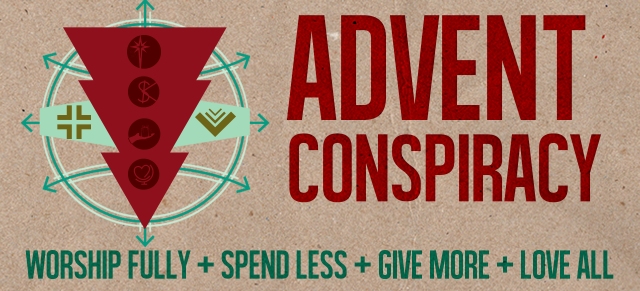This year at my church in Alabama, we are participating in a global movement called Advent Conspiracy. During the four weeks of Advent, the time of preparation leading up to the birth of Jesus on Christmas Day, we are focusing on four areas.

1. Worshiping Fully
2. Spending Less
3. Giving More
4. Loving All
These might seem fairly basic, and they are. But how many of us actually commit to living out these four principles of our faith, especially during the most joyous season of the year? The goal of these few weeks of Advent is to capture the contagious joy of Christ's coming by looking beyond the glitter and candy to see the reason for the season.
In the beginning was the Word, and the Word was with God, and the Word was God. The Word became flesh and made his dwelling among us. We have seen his glory, the glory of the one and only Son, who came from the Father, full of grace and truth.
Pastor Rusty used this example in his sermon two weeks ago: What if Mercedes-Benz told everyone at Christmas not to buy any cars from them, but to go and give their money away? How earth-shattering would that be? Think of the huge impact a decision like that could have on the global water crisis, world poverty, or homelessness? We all know that won't happen, but maybe it could happen, in our own family, church, or community.
It's like in Miracle on 34th Street, when Macy's decides to follow Santa's example and actually encourages customers to shop at another store with a better deal. If, for just a second, we could take the focus off ourselves and realize that WE are the answer to our prayers to end world hunger, the Ebola crisis, human trafficking, how powerful would that be? God has given many of us the resources. Now we must choose to use them for good.
Jesus was all about giving, not just his time and resources, but also sharing the Good News. God is love. The Savior has come. There is hope. If only you take up your cross and follow me. He never lost sight of the target - to transform lives with His love. This year I want to let go of the fake, shiny holiday Christmas has become. Instead of extravagant consumption, shouldn't it really be about extravagant love anyway?
With my co-conspirators at Cornerstone Church, I am conspiring to follow Jesus. We are making this Christmas different. Not only by focusing less on the material, but by giving more of myself to God. Worshiping fully. Taking time to adore the incredible God who chose to come to Earth as a baby in a manger. And loving everyone. Not just those around me, but neighbors and strangers and those who maybe don't have anymore to spend Christmas with.
As we wait in anticipation for the Redeemer of the world to come, let us shine his light in all the world, especially in those dark corners, just as Christ did.
May the joy of Christmas be with you throughout this season!








































